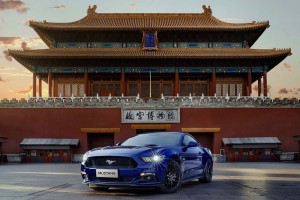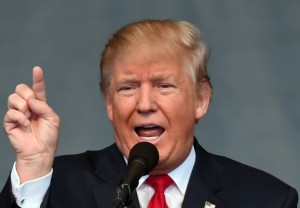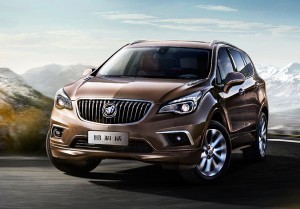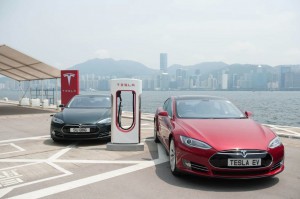Words, rather than gunshots, rang out overnight as the Trump administration officially enacted an estimated $50 billion in new trade tariffs on China, leading the massive Asian giant to strike back with new duties worth about $34 billion.
The U.S., Chinese officials declared, has launched “the biggest trade war in economic history.” The government, borrowing a page from the Trump playbook, called the U.S. administration “a gang of hoodlums.” The White House, meanwhile, said it was in for the long-term, if need be, and could levy billions of dollars in additional tariffs against one of America’s biggest trade partners.
The battle, which few analysts expect to be resolved quickly, will impact a broad spectrum of industrial sectors, everything from entertainment to agriculture, though automotive manufacturers could be particularly hard-hit.
During the past two decades, as China’s automotive market grew from a backwater to the world’s largest, most foreign carmakers have set up manufacturing facilities in-country. But there are still a significant number of auto imports, including the 267,000 vehicles the U.S. shipped to China in 2017. They now will face 35% tariffs, up from the earlier 25% duty. China had actually been prepared to start rolling back tariffs on imported cars and likely still will do so on products coming in from Europe and other parts of the world.
(GM building mini-pickup in China. Click Here for the story.)

Despite to the hefty new tariffs, Ford has elected to keep the price the same on the Mustang and other vehicles to gain momentum.
Ford could be one of the manufacturers hardest hit by the trade war. The automaker has been in an extended slump in China, sales tumbling 38% during the first half of the year. One of its few bright spots has been the Mustang which has been gaining traction in the Chinese market during the last several years. Hoping to gain still more momentum, Ford this week said it will maintain prices on imported models – which also include some Lincoln-branded products – and swallow the added duties.
The trade war is threatening not only traditional Detroit manufacturers but also foreign-owned brands such as BMW, which last year shipped over 100,000 sport-utility vehicles to China from its assembly plant in Spartanburg, South Carolina. The German automaker has warned that it may pull back on further investments in what had become one of its largest global assembly plants.
While its become difficult to avoid Chinese-made products when shopping for consumer goods these days, one exception is in the automotive sector. Currently, only a handful of Chinese vehicles are available on the American market, and all are sold under more familiar Western brand names. That includes a version of Volvo’s 60-Series line, though the Chinese-owned, Swedish-based carmaker had been planning to add more models to the list in the coming years.
Also affected are two Chinese-made models sold by General Motors. GM says it is now evaluating what it will do with both of those products, especially the popular Buick Envision SUV.
The extent to which the trade war might escalate is far from certain, but both U.S. and Chinese officials have warned they are ready to let it play out over an extended period, if need be, raising questions about Pres. Donald Trump’s assertion that trade wars “are easy to win.”
Among the other potential weapons the Trump Administration is exploring is the possibility of restricting U.S. investments in Chinese companies and, perhaps more likely, Chinese investments in the U.S.
Depending on how things develop, the impact could be significant for the auto industry. Tesla, for example, is getting ready to announce plans to set up its first Chinese assembly plant. Such a move would help it sidestep the new tariffs on American-made automobiles.
(Click Here for more about China phasing out JV rules over five years.)
But the Trump administration could short-circuit those plans. Currently Chinese law requires foreign manufacturers partner up with domestic automakers when opening up assembly lines in China, although they are mulling over a provision removing that restriction for new energy vehicle makers, like Tesla.
However, Trump is considering invoking a similar requirement on Chinese companies looking to invest in America, and limiting the number of tie-ups American companies can enter into in China. Nothing has been enacted yet, and no timetable is set.
Tencent, a Chinese investment giant with a market capitalization of $460 billion, is already one of Tesla’s largest investors, having acquired a 5% stake in the California-based electric-vehicle company for $1.8 billion. Tencent is also tied to various Silicon Valley projects, including the start-up Zoox, which is developing self-driving vehicle technology for ride-sharing fleets.
In fact, some of the most significant automotive links between the U.S. and China involve investments in advanced vehicle technologies, such as autonomous driving software and hardware. America’s Sequoia Capital has funded 20 Chinese start-ups.
Chinese investors have pumped billions of dollars into U.S. start-ups hoping to challenge the established motor vehicle hierarchy. That includes California-based Faraday Future, which has been working on an electric self-driving supercar. While original investor Jia Yueting – often referred to as “China’s Steve Jobs” – has had to cut back on his cash infusion, Faraday late last month announced it lined up a much-needed new investor, Hong Kong-based Evergrande Health agreeing to take a 45% stake in the carmaker for $2 billion.
If there’s a potentially positive side to the trade war with China it’s that the U.S. and Europe appear to be redoubling efforts to head off a similar battle. German Chancellor Angela Merkel this past week suggested that both the EU and the U.S. could lift automotive tariffs entirely.
(To see more about Lincoln’s plans for five new models in China, Click Here.)
Ironically, that strategy could create some new headaches, particularly for the Detroit automakers. They’ve largely maintained a monopoly on the lucrative full-size pickup segment because of the decade’s old “chicken tax” enacted by the U.S. in retaliation for trade restrictions on U.S. poultry. It has placed a 25% duty on imported pickups, essentially eliminating any threat from foreign-made trucks. With pickups far and away the most profitable products Detroit builds, opening the market to import competitors could generate significant resistance from the Motor City.



